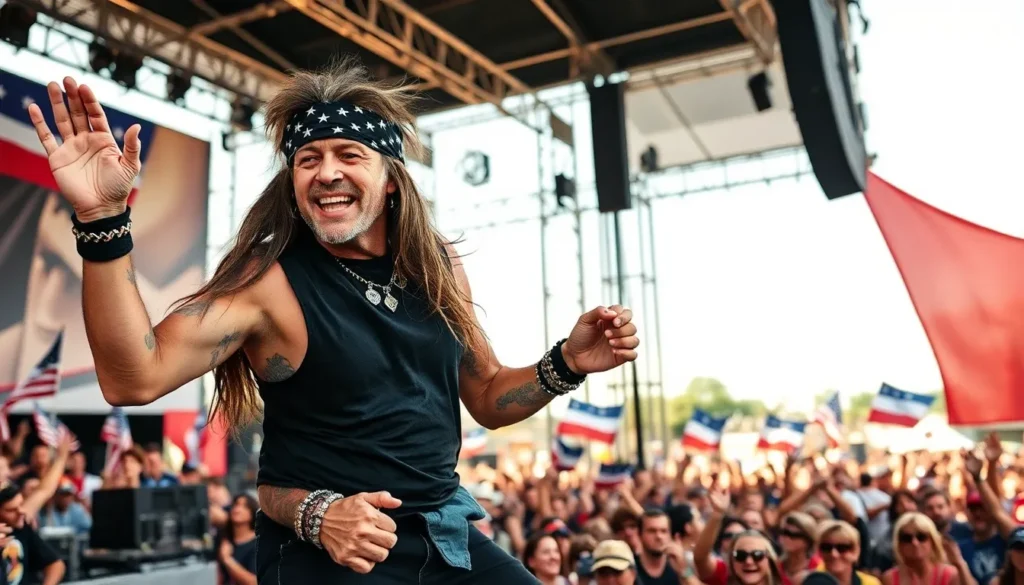In a world where music and politics often clash, Kid Rock’s recent olive branch to Trump supporters has stirred quite the buzz. Picture this: a rock star, a controversial figure, and a political allegiance all wrapped into one. It’s like mixing peanut butter and pickles—unexpected but oddly intriguing.
As Kid Rock strums his guitar, he’s not just playing tunes; he’s strumming the chords of unity for a divided fanbase. With a wink and a nod, he’s inviting everyone to join the party, regardless of their political leanings. This move might not just be about music; it’s a bold statement that could redefine the relationship between artists and their audiences. So, grab your favorite drink, sit back, and let’s dive into this fascinating blend of rock and politics. You might just find yourself tapping your toes while contemplating the complexities of modern fandom.
Table of Contents
ToggleKid Rock’s Stance on Politics
Kid Rock actively engages in political discussions, blending his music career with his beliefs. His outreach efforts aim to connect with diverse audiences, emphasizing unity amidst political divides.
Overview of Kid Rock’s Political Involvement
Kid Rock emerged as a vocal supporter of various political figures. His positions often reflect a combination of conservative values and a desire for candid dialogue. In recent years, he attended rallies and made public statements endorsing former President Donald Trump. These actions positioned him as a significant figure in the intersection of music and politics. Artists like Kid Rock shape cultural conversations, influencing perspectives beyond traditional political spheres.
Relationship with Trump Supporters
Kid Rock’s relationship with Trump supporters is characterized by mutual admiration. Fans resonate with his unapologetic style and political candor. He frequently communicates a sense of camaraderie with those who align with Trump’s views. By inviting Trump supporters to his shows, he fosters an inclusive environment. This relationship contrasts with the often polarized nature of contemporary politics, showcasing his intent to bridge gaps. Engaging actively in this political landscape, Kid Rock creates a platform for dialogue among fans of various backgrounds.
The Olive Branch Metaphor

The olive branch symbolizes peace and reconciliation. Its historical context spans cultures, signifying a desire to end conflict and foster relationships. In Kid Rock’s outreach to Trump supporters, this metaphor embodies his efforts to bridge divides within his fanbase. He promotes dialogue among diverse political viewpoints and emphasizes understanding over division.
Meaning and Significance
The olive branch carries deep cultural meanings, often representing forgiveness and unity. Its significance amplifies in a politically charged environment like today, where polarization can dominate conversations. Kid Rock’s invitation to Trump supporters echoes this theme, promoting an atmosphere where different opinions can coexist. By adopting this symbolism, he positions himself as a mediator, encouraging collaboration rather than hostility among fans.
Application in Political Discourse
The olive branch metaphor applies effectively to contemporary political discussions. Kid Rock’s approach demonstrates a willingness to engage with opposing views while seeking common ground. His concerts become forums where political dialogue thrives. Supporters from various backgrounds gather, fostering unity despite differences. Through these gatherings, the olive branch represents not only his musical ethos but also a call for more constructive political engagement.
Analyzing Kid Rock’s Support for Trump
Kid Rock’s outreach to Trump supporters reflects his commitment to unity among fans.
Concerts and Public Appearances
Concerts serve as a platform for Kid Rock to bring together fans of various political views. During these events, he makes a point to welcome Trump supporters, creating an inclusive atmosphere. His performances often feature political commentary, blurring the lines between music and activism. By addressing both his conservative and liberal fans, he fosters dialogue about shared values. This approach cultivates a sense of community among attendees, encouraging interaction across political divides.
Impact on His Fanbase
Kid Rock’s support for Trump affects his fanbase significantly. Many fans appreciate his unapologetic stance on political issues, finding common ground in shared beliefs. Loyal supporters feel empowered by his willingness to engage in controversial discussions. Consequently, some new fans are drawn to his music, intrigued by his boldness. This dynamic drives increased attendance at concerts, as fans seek an environment where diverse opinions are acknowledged. Ultimately, Kid Rock influences cultural conversations, encouraging fans to embrace differing perspectives while promoting unity.
Reactions from Fans and Critics
Kid Rock’s outreach to Trump supporters has elicited varied reactions from his fanbase and critics alike.
Support from Trump Supporters
Many Trump supporters express strong admiration for Kid Rock’s approach. Fans appreciate his willingness to engage with political issues openly. His concerts often create an atmosphere where attendees feel welcomed, regardless of their political affiliation. Supporters admire his unapologetic style. They value opportunities to gather and share viewpoints in a setting that encourages dialogue. His invitation to unite fans across political lines resonates, symbolizing a desire for inclusion. Rallies and shows become platforms for expressing shared values and beliefs. This engagement contributes to a sense of community among supporters, reinforcing their loyalty to both Kid Rock and their political ideals. His boldness inspires many, making them feel empowered to voice their opinions.
Criticism from Opponents
Opponents approach Kid Rock’s outreach with skepticism and disapproval. Critics argue that his stance can polarize audiences further. Some perceive his political commentary as divisive rather than unifying. They challenge the idea that music can effectively bridge political divides. Detractors express concern over the implications of a celebrity endorsing controversial figures. Negative reactions highlight fears of alienating fans with differing viewpoints. Despite his intentions, critics believe his actions may deepen existing rifts rather than heal them. The dialogue surrounding his efforts reflects broader societal tensions, illustrating the complexities of merging entertainment with politics. This criticism serves as a reminder of the challenges artists face when navigating politically charged environments.
Kid Rock’s outreach to Trump supporters represents a significant moment in the intersection of music and politics. By extending an olive branch to fans across the political spectrum, he’s challenging the status quo and promoting dialogue. His concerts become more than just entertainment; they’re platforms for unity and understanding.
While reactions vary, his commitment to inclusivity resonates with many who appreciate his candid approach. Kid Rock’s efforts to bridge divides highlight the potential for artists to foster community and encourage constructive political engagement. As he navigates this complex landscape, he continues to influence cultural conversations, reminding audiences of the power of music to unite rather than divide.





